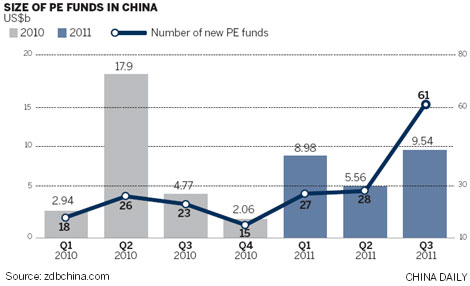Economic slowdown a boon to Blackstone
Updated: 2011-10-28 08:04
By Shen Jingting (China Daily)
|
|||||||||
But PE giant says Chinese property prices too high for investment now
BEIJING - China's economic slowdown will result in more acquisition opportunities for foreign investors, Blackstone Group executives said.
But the world's largest private equity (PE) company will shun China's real estate market for the time being because property prices have risen too high.
"Blackstone will be much more enthusiastic in a softer economic environment," Stephen Schwarzman, chairman and chief executive officer of the Blackstone Group, said in Beijing on Thursday. The Chinese economy grew at a slower pace of 9.1 percent in the third quarter, a slowdown Schwarzman said "may give rise to some economic dislocations".

That dislocation means that some companies may have financial difficulties, a scenario he said will provide good opportunities for investors such as Blackstone.
Schwarzman said Blackstone likes to invest when other people become pessimistic. "When most people are scared and leaving, we try to see what will change positively."
Blackstone entered China in 2007. It has made a dozen investments so far, including a stake in the agricultural products distributor Dili Group Holdings Co Ltd last year and a 20 percent stake in China National BlueStar Group Corp, a specialty chemicals maker, in 2008.
Blackstone's total investment in China surpassed $1 billion in 2010. Schwarzman, who founded Blackstone in 1985, said he will be very happy to increase the pace and investment in China.
But he said his company does not have much interest in China's real estate market at present, though he believes that good investment opportunities will come as China is moving to a softer economic environment.
High property prices have been among the reasons Blackstone thought the time not conducive to investing in China's real estate market, Schwarzman said.
The company's recent sale of a 95 percent stake in a Shanghai shopping center, Channel One, to Hong Kong-listed New World Development Co for 1.46 billion yuan ($230 million), is "a successful investment", Schwarzman said.
The company bought the Shanghai property in 2008 for about 1 billion yuan and then significantly increased its tenant ratio.
However, Antony Leung, the group's chairman for Greater China, said Blackstone is confident about China's real estate market in the long term. "The trend for China's urbanization is still there. When (property) prices are going down, they will be attractive," Leung said.
The New York-based firm was one of the first foreign PE companies to set up yuan-denominated fund in China, in 2009. It is working toward raising a 5 billion yuan fund. The first round of fundraising concluded in April, but the company didn't reveal how much money it gathered.
Leung said Blackstone has already made several investments through its yuan fund, but he declined to reveal details. The company has shown interest in investing in consumer-related industries, such as healthcare and medical industries in China.
Blackstone has been kept placed on record by the National Development and Reform Commission in October as a qualified PE player to operate in China. That can help Blackstone gain an opportunity to absorb money from China's national pension fund - the National Social Security Fund.
"We are still working on inviting the National Social Security Fund to become our investor," Leung said.
Blackstone's rivals such as the Carlyle Group and TPG Capital, as well as investment banks Morgan Stanley and Goldman Sachs Group Inc, have established yuan-denominated funds. These firms are trying to raise a total of more than 21 billion yuan, according to the Wall Street Journal.
China Daily

(China Daily 10/28/2011 page13)











